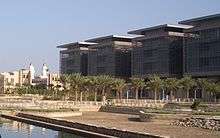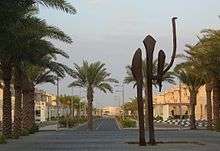King Abdullah University of Science and Technology
| جامعة الملك عبد الله للعلوم والتقنية | |
 | |
| Motto | "Through Inspiration, Discovery" |
|---|---|
| Type | Private |
| Established | September 5, 2009 |
| Endowment | 20 Billion US dollars |
| President | Jean-Lou Chameau |
| Undergraduates | None |
| Postgraduates | 1200[1] |
| Location |
Thuwal, Makkah Province, Saudi Arabia Coordinates: 22°18′45″N 39°06′38″E / 22.312602°N 39.11047°E |
| Campus | 3,600 hectares (8,900 acres) |
| Colors | Green, yellow, orange, blue |
| Website | www.kaust.edu.sa |
King Abdullah University of Science and Technology (KAUST) (Arabic: جامعة الملك عبد الله للعلوم و التقنية jāmiʿat al-malik ʿabd al-Lāh li-l-ʿulūm wa-t-teqniyya) is a private research university located in Thuwal, Saudi Arabia.
KAUST was founded in 2009 and focuses on graduate education and research, using English as the official language of instruction. It offers programs in Biological and Environmental Science and Engineering; Computer, Electrical and Mathematical Science and Engineering; and Physical Science and Engineering. It was announced in 2013 that KAUST had one of the fastest growing research and citation records in the world.[2] KAUST was ranked as the world's top university in (citations per faculty) ranking indicator as per QS World University Rankings for 2015-2016[3] and 2016-2017.[4]
History
KAUST officially opened on September 23, 2009.
Campus


The university's core campus, located on the Red Sea at Thuwal, is sited on more than 36 square kilometres (14 sq mi), encompassing a marine sanctuary and research facility.[5]
KAUST is the first mixed-gender university campus in Saudi Arabia. Saudi authorities hope the mixed-gender center will help modernize the Kingdom's deeply conservative society.[6] The religious police do not operate on-site. Women are allowed to mix freely with men and to drive on campus, and they are not required to wear veils in the coeducational classes.[7]
KAUST was Saudi Arabia's first LEED certified project and is the world's largest LEED Platinum campus.[8] Designed by international architecture firm HOK, it was also chosen by the American Institute of Architects (AIA) Committee on the Environment (COTE) as one of the 2010 Top Ten Green Projects.[9] The university library received the 2011 AIA/ALA Library Building Award for accomplishments in library architecture.[10]
Laboratories
Research institutions in the Kingdom and the region will link to the University’s supercomputer and other laboratory facilities through the 10 gigabits per second (Gbps) Saudi Arabian Advanced Research and Education Network (SAREN).[11]
- Supercomputer: Shaheen—the Arabic word for peregrine falcon—is the fastest supercomputer in the Middle East and one of the most powerful in the world. Developed by IBM, it is capable of 222 teraflops, or 222 trillion floating point operations per second. Shaheen was replaced by Shaheen II in 2015.
- Visualization: CORNEA is a fully immersive, six-sided virtual reality facility that gives students and researchers the ability to turn data into 3D structures that they can interact with and examine. It was built in partnership with the University of California, San Diego.
- Nanofabrication, Imaging, and Characterization: A clean-room environment equipped with tools to support research in advanced materials, biotechnology, electronics and photonics, and MEMS/NEMS. The Imaging and Characterization Labs include a suite of 10 nuclear magnetic resonance (NMR) spectrometers and facilities for scanning, transmission, confocal, and Raman Spectroscopy, magnetic and thermal measurements, allowing scientists to examine nanostructure devices and surfaces down to the level of individual atoms.
- Coastal and Marine Resources: Located next to the Red Sea, the Coastal and Marine Resources Lab facilitates marine research. The facility builds and deploys oceanographic instrumentation and provides operational services to support research vessels for marine exploration, diving, and sampling. Indoor and outdoor seawater facilities allow researchers to culture marine organisms.
- Analytical Core: These labs focus on spectroscopy, chromatography and mass spectrometry, trace metals analysis, wet chemistry, and surface analysis.
- Biosciences and Bioengineering: These facilities include genomic and proteomic labs essential to the study of cellular molecules for DNA sequencing and genetic analysis, as well as the investigation of cellular processes. The genomics facility is equipped with robots and laboratory automation.[11]
Research and Technology Park
The research park allows technology-based businesses to establish office space, laboratory space or R&D and demonstration facilities. The park also provides incubators for technology startups. The park occupies around 2.7 million square meters of space next to the academic campus. Current tenants include Saudi Aramco, Dow Chemical and SABIC.[12]
Residential neighborhoods
KAUST students, faculty and staff live in one of three residential areas: Safaa Gardens, Harbor District and Safaa Island neighborhood. Areas of community activity include Discovery Square, multiple gym facilities, libraries, and coffee shops. Discovery Square includes a movie theater, a grocery store, and several restaurants.
Academics and research
The university organizes interdisciplinary collaborative research teams across three academic divisions Biological and Environmental Science and Engineering (BESE); Computer, Electrical, and Mathematical Science and Engineering (CEMSE); and Physical Science and Engineering (PSE). It offers two graduate programs: a Master of Science degree (18 months) and a Ph.D. program (3–4 years).[13]
KAUST focuses on research that applies science and technology to problems of human need, social advancement, and economic development.[11] The main research thrusts are Resources, Energy and Environment; Biosciences and Bioengineering; Materials Science and Engineering; Applied Mathematics and Computational Science.[11]
To support these thrusts, KAUST established multidisciplinary Research Centers focused on catalysis, clean combustion, computational bioscience, geometric modeling and scientific visualization, membranes, desert agriculture, Red Sea science and engineering, solar and alternative energy science and engineering, and water desalination and reuse.[11]
Organization and administration
The first president of the university was Choon Fong Shih.[14] On February 16, 2013, the executive committee of the board of trustees at KAUST appointed Jean-Lou Chameau, the former president of the California Institute of Technology, as the new President of KAUST.[15]
The board of trustees is headed by the former Saudi oil minister and OPEC leader Ali Al-Naimi. Furthermore, several current and former ministers serve on the board of trustees, like Al-Naimi's successor Khalid A. Al-Falih, Abdulaziz bin Abdullah bin Abdulaziz Al Saud, Mansour bin Abdulaziz Al Saud, and Mishaal bin Abdullah Al Saud. Moreover, the president and CEO of Saudi Aramco Amin H. Nasser and the former president of the Islamic Development Bank Ahmed Mohammed Ali Al-Madani are among the Saudi board members. The international board members comprise the global managing director and CEO of McKinsey & Company Dominic Barton as well as several current and former university presidents like Charles M. Vest (MIT), Shirley M. Tilghman (Princeton), Frank H.T. Rhodes (Cornell), Alice P. Gast (Imperial College), Tony Chan (HKUST), and Nam Pyo Suh (KAIST).[16]
KAUST has established self-directed organizations. Its graduate student council was established in 2009, for voicing students' interests. Under the council there are four subcommittees: Academic and Research Committee, Graduate Life Committee, International Business Relations Committee and University Relations Committee.[17]
Students
As of September 2014, KAUST has 840 students in total. The student population comes from over 60 nationalities from all continents. The largest single national representation is from China with India in second place. Saudi Arabia is the third most prevalent nationality of the student make up.
References
- ↑ http://www.timeshighereducation.co.uk/420231.article
- ↑ http://www.al-fanarmedia.org/2013/10/how-saudi-universities-rose-in-the-global-rankings
- ↑ "QS World University Rankings® 2015/16". 2015-09-11. Retrieved 2016-10-02.
- ↑ "QS World University Rankings 2016". 2016-08-25. Retrieved 2016-10-02.
- ↑ "KAUST general FAQs". King Abdullah University of Science and Technology. Retrieved 2 October 2009.
- ↑ Slackman, Michael (18 November 2009). "A Saudi Gamble to See if Seeds of Change Will Grow". The New York Times. Retrieved 3 April 2013.
- ↑ BBC - Saudis open hi-tech science oasis
- ↑ World's largest LEED-Platinum project finds place in Top Ten Green Projects
- ↑ AIA’s Top Ten Green Architecture Projects of 2010
- ↑ KAUST Library - 2011 AIA / ALA Library Building Awards
- 1 2 3 4 5 "KAUST Research". King Abdullah University of Science and Technology.
- ↑ Abdullah University of Science and Technology
- ↑ "KAUST Academics". King Abdullah University of Science and Technology.
- ↑ Selingo, Jeff (22 April 2011). "Saudi Arabia's Elite New University Pursues 'High-Risk Research for a High Return'". The Chronicle. Retrieved 3 April 2013.
- ↑ "KAUST appoints new president". Asharq Alawsat. 21 February 2013. Retrieved 3 July 2013.
- ↑ KAUST Board of Trustees.
- ↑ http://www.kaust.edu.sa/student_services/graduateservices/council.html?submenuheader=0